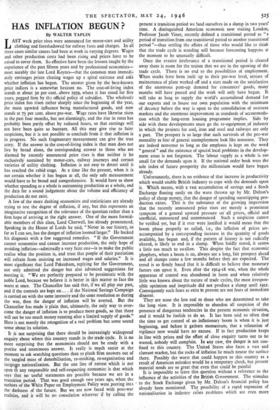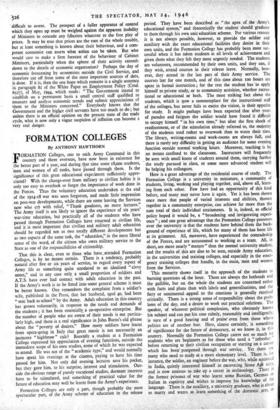HAS INFLATION BEGUN?
By WALTER TAPLIN
LAST week price rises were announced for motor-cars and utility clothing and foreshadowed for railway fares and charges. In all three cases similar causes had been at work in varying degrees. Wages and other production costs had been rising and prices have to be raised to cover them. So effective have been the lessons taught by the experience of the past fifteen years and by professional economists— most notably the late Lord Keynes—that the common man immedi- ately envisages prices chasing wages up a spiral staircase and asks whether inflation has begun. The answer given by the best-known price indices is a somewhat hesitant no. The cost-of-living index stands at about 30 per cent. above 1939, where it has stood for five years, pegged firm by the official policy of subsidies. The wholesale
index ndex has risen rather sharply since the beginning of the year, the main upward influence being manufactured goods, and now stands at 75 per cent, above pre-war. Wage rates have likewise risen in the past four months, but not alarmingly, and the rise in rates has probably been partly offset by reduced hours, so that earnings will not have been quite so buoyant. All this may give rise to faint suspicions, but it is not possible to conclude from it that inflation is in progress. No such fragmentary measurement can give the true story. If the answer to the cost-of-living index is that man does not live by bread alone, the corresponding answer to those who are alarmed by recently announced price rises is that neither is he exclusively sustained by motor-cars, railway journeys and certain varieties of utility clothing. Inflation is not easy to detect until it has reached the rabid stage. At a time like the present, when it is not certain whether it has begun at all, the only safe measurement would have to be broad and comprehensive. It would have to show whether spending as a whole is outrunning production as a whole, and the data for a sound judgement about the volume and efficiency of production do not exist.
A few of the more dashing economists and statisticians are already trying to test the degree of inflation, if any, but this represents an imaginative recognition of the relevance of the question rather than a firm hope of arriving at the right answer. One of the more formid- able members of this class, Lord Cherwell, has already pronounced. Speaking in the House of Lords he said, "Never in our history, so far as I can see, has the danger of inflation loomed larger." He backed his diagnosis with a few suggested remedies. "If the Government cannot economise and cannot increase production, the only hope of avoiding inflation—admittedly a very faint one—is to make the public realise what the position is, and trust that people of their patriotism will refrain from insisting on increased wages and salaries." It is most significant that Lord Pakenham, replying for the Government, not only admitted the danger but also advanced suggestions for meeting it. "We are perfectly prepared to be pessimistic with the noble Lord, because we believe it is better in this matter to face the worst at once. The Chancellor has said that, if we all play our part, and if the controls are kept on .. . if the National Savings Campaign is carried on with the same intensity and the same resolution as during the war, then the danger of inflation will be averted. But the Chancellor has made it plain that, ultimately, the only way to over- come the danger of inflation is to produce more goods, so that there will not be too much money running after a limited supply of goods." Here is not merely the recognition of a real problem but some sound sense about its solution.
It is not surprising that there should be increasingly widespread enquiry about where this country stands in the trade cycle. It is no more surprising that the economists should not be ready with a precise and unanimous answer. It really is much easier at the moment to ask searching questions than to pluck firm answers out of the tangled mass of demobilisation, re-stocking, re-organisation and incipiipt nationalisation. But the one line of retreat which is not open to any responsible and self-respecting economist is that which says that no useful statements are possible because we are in a transition period. That was good enough two years ago, when the authors of the White Paper on Employment Policy were peering into the darkness of the future. But we are now faced with post-war realities, and it will be no consolation whatever if by calling the present a transition period we !and ourselves in a slump in two years' time. A distinguished American econonisit now visiting London, Professor Jacob Viner, recently defined a transitional period as "a period of transition from one transitional period to another transitional period "—thus settling the affairs of those who would like to think that the trade cycle is standing still because forecasting happens at the moment to be unusually difficult.
Once the evasive irrelevance of a transitional period is cleared away there is room for the truism that we are in the upswing of the trade cycle. There is no end to the possibilities of employment.
When stocks have been built up to their pre-war level, arrears of maintenance of plant worked off and a start made on the satisfaction of the enormous pent-up demand for consumers' goods, many months will have passed and the work will only have begun. It will take as long to supply the world's accumulated demand for our exports and to house our own population with the minimum of decency before the way is open to the consolidation of overseas markets and the enormous improvement in standards of accommoda- tion which the long-term housing programme implies. Side by side with these developments must go the re-equipment of industry in which the projects for coal, iron and steel and railways are only a part. The prospect is so large that such survivals of the pre-war mentality as fear of general unemployment look like nonsense. They are indeed nonsense so long as the emphasis is kept on the word " general " and the existence of special local problems in the develop- ment areas is not forgotten. The labour supply as a whole is too small for the demands upon it. If the national order book were the sole index of future prosperity the millennium would have begun already.
Unfortunately, there is no evidence of that increase in productivity which would enable British industry to cope with the demands upon it. Which means, with a vast accumulation of savings and a Stock Exchange floating easily on the wave thrown up by Mr. Dalton's policy of cheap money, that the danger of spending outstripping pro- duction exists. This is the substance of the growing impression that the recently announced price rises are merely a prominent symptom of a general upward pressure on all prices, official and unofficial, announced and unannounced. Such a suspicion cannot be verified yet, but if it ever were justified it would mean that the boom phase properly so called, i.e., the inflation of prices un- accompanied by a corresponding increase in the quantity of goods available, has begun and, if the pattern of history is not radically altered, is likely to end in a slump. When baldly stated, it seems a little too much to swallow. This despite the fact that economic phophets, when a boom is on, always see a long, fair prospect ahead and all slumps come a few months before they are expected. The trend is so firmly based that it is difficult to believe that monetary factors can upset it. Even after the 1914-18 war, when the whole apparatus of control was abandoned in haste and when relatively little was known about the nature of trade cycles, the most irrespon- sible optimism and ineptitude did not produce a slump until 1921. Consequently such fears as exist at present are not fears of immediate disaster.
They are none the less real to those who are determined to take the long view. It is impossible to abandon all suspicion of the presence of dangerous tendencies in the present economic siniation, and it would be foolish to do so. It has been said so often that the time to get control of an inflationary boom is when it is just beginning, and before it gathers momentum, that a relaxation of vigilance now would have no excuse. If in fact production keeps in line with prices and the effort of close enquiry turns out to be wasted, nobody will complain. In any case, the danger is not con- fined to this country. The United States also faces a vast and clamant market, but the rocks of inflation lie much nearer the surface there. Possibly the worst that could happen to this country as a result of American mistakes would be a temporary check, but present material needs are so great that even that could be painful It is impossible to leave this question without a reference to the influence of the activities of the British Government. The stimulus to the Stock Exchange given by Mr. Dalton's financial policy has already been mentioned. The possibility of a rapid expansion of nationalisation in industry raises problems which are even more difficult to assess. The prospect of a fuller apparatus of control which they open up must be weighed against the apparent inability of Ministers to concede any fenction whatever to the free play of prices. It may be true that prices are the root of the whole trouble, but at least something is known about their behaviour, and a com- petent economist can assess what action can be taken. But who would care to make a firm forecast of the behaviour of Cabinet Ministers, particularly when the sphere of their activity extends down to the details of economic organisation? Perhaps the day of economic forecasting by economists outside the Civil Service, and therefore cut off from some of the most important sources of data, is done. If it is, then the one hope which remains is a single sentence in paragraph 81 of the White Paper on Employment Policy (Cmd. 6527), of May, 1944, which reads: "The Government intend to establish on a permanent basis a small central staff qualified to measure and analy3e economic trends and submit appreciations cf 'them to the Ministers concerned." Everybody knows that the Government and the higher civil servants have too much to do ; but unless there is an official opinion on the present state of the trade cycle, what is now only a vague suspicion of inflation can become a very real danger.



























 Previous page
Previous page